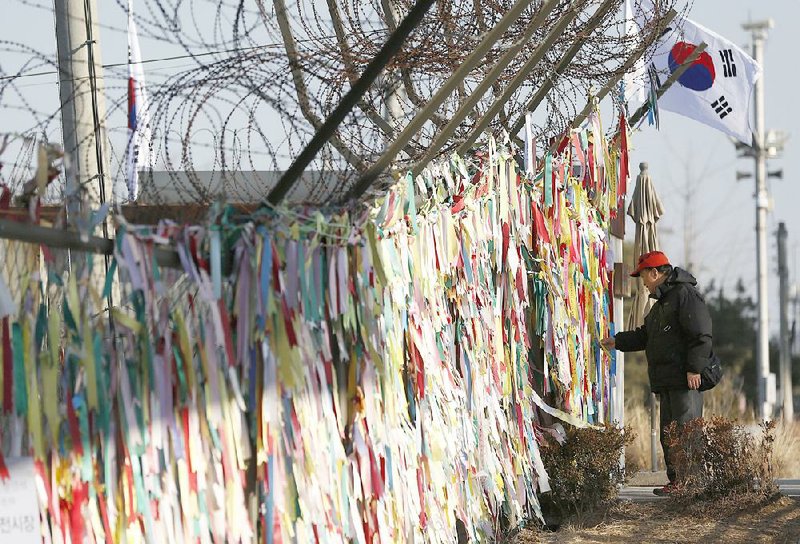SEOUL, South Korea -- North Korean leader Kim Jong Un called on his scientists to do more to boost the country's arsenal after the regime conducted its fourth nuclear test last week in defiance of neighbors including China and South Korea.
Speaking to the scientists responsible for building what North Korea said was a hydrogen bomb, Kim said it was his "expectation and conviction" they would advance their research, the official Korean Central News Agency said Monday. Kim has said the nuclear program is defensive and designed to prevent a U.S.-led invasion.
Kim's comments come as the U.S. and South Korea seek international support to punish the isolated nation for the test and pressure it to halt its nuclear program. The U.S. on Sunday sent a B-52 bomber on a low-level flight south of Seoul, while South Korea has restarted propaganda broadcasts across its heavily armed northern border. The loudspeaker bursts risk pushing South Korea and North Korea "toward the brink of war," North Korean official Kim Ki Nam said on Friday, Yonhap reported.
"North Korea has every political and technical reason to test nuclear devices and missiles," said Duyeon Kim, a Seoul-based nonresident associate in the Nuclear Policy Program and Asia Program at the Carnegie Endowment for International Peace. "We know they will continue doing it, so the real question is what will we do about it."
North Korea launched a long-range rocket before each of its previous three nuclear tests, which resulted in a tightening of international sanctions. But trade bans on arms and luxury items have failed to persuade it to return to disarmament talks that broke down in 2009, leading it to revive the production of nuclear devices.
North Korea said Wednesday that it tested its first hydrogen bomb, drawing skepticism from arms experts as the tremors were similar to those of the smaller, conventional atomic devices previously detonated. In the aftermath of the test, South Korea beefed up its defensive positions near sites where it set up loudspeakers blaring messages critical of North Korea along with K-pop music. The U.S. deployed the B-52 with an escort of South Korean F-15 and U.S. F-16 fighters, according to U.S. Forces Korea.
No significant troop movements have been detected in North Korea that could signal an imminent provocation, and the U.S. is in talks with South Korea about deploying more strategic assets to the peninsula, South Korean Defense Ministry spokesman Kim Min Seok said Monday at a briefing.
The U.S. and South Korea are struggling to get backing for a united response from China, which is North Korea's main ally. South Korean nuclear negotiator Hwang Joon Kook will meet with his Chinese counterpart Wu Dawei in China on Thursday to discuss the issue, Seoul's Foreign Ministry said on its website. Hwang will separately meet with his Japanese and U.S. counterparts in Seoul on Wednesday.
Chinese Foreign Minister Wang Yi told his South Korean counterpart Yun Byung Se by phone Friday that efforts should be made to restart talks to end North Korea's nuclear program, according to a text message from South Korea's foreign ministry. U.S. Secretary of State John Kerry on Thursday urged China to support a more aggressive approach with Pyongyang, saying its North Korea policy had been a failure.
In an editorial, China's official Global Times newspaper blamed the "hostile policy" of the U.S. toward North Korea for prompting the nuclear tests.
"China is not the cause and crux of the Korean nuclear issue, nor is it the key to resolving the problem," Foreign Ministry spokesman Hua Chunying said in Beijing on Friday.
Still, the second nuclear test since Kim came to power four years ago may have angered President Xi Jinping, who in October sent a high-ranking envoy to Pyongyang with a handwritten letter seeking deeper cooperation. North Korea, while accepting energy and food aid from China, has spurned Beijing's efforts to drop its nuclear program and return to talks.
China may be reluctant to crack down hard on North Korea for fear of destabilizing the regime in case it sends millions of refugees across China's border or lead to an eventual unification with the South, leaving a well-armed U.S. ally on China's frontier.
The potential for a collapse in North Korea is a bigger threat to South Korea than a direct military confrontation, credit ratings agency Moody's Investors Service analysts Shirin Mohammadi and Steffen Dyck said in an e-mailed note Monday.
"The North Korean regime has survived for more than 65 years, but internal economic and political strains could eventually lead to a sudden collapse. Such a development is a risk that would pose enormous challenges for South Korea," they wrote.
Also, North Korea has detained a U.S. citizen on suspicion of spying, CNN reported Monday.
It said a man identified as Kim Dong Chul was being held by the Pyongyang government and said authorities had accused him of engaging in spying and stealing state secrets.
In an interview with a CNN correspondent, Kim said he had traveled extensively in recent years between China and North Korea and had made some trips to South Korea as well.
In Washington, State Department spokesman John Kirby said he could not confirm the report. He declined to discuss the issue further or confirm whether the U.S. was consulting with Sweden, which handles U.S. consular issues in North Korea because Washington and Pyongyang do not have diplomatic relations.
"We are looking into the matter, and when we have more that we can say -- if we have more that we can say -- we will," Kirby told reporters.
CNN displayed Kim's U.S. passport and said he had lived in China for many years, but also had resided in Fairfax, Va.
Information for this article was contributed by Sam Kim and David Tweed of Bloomberg News and by staff members of The Associated Press.
A Section on 01/12/2016

